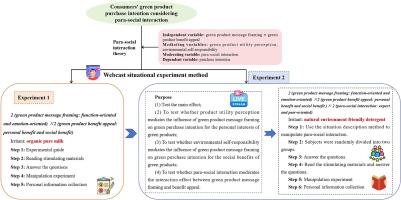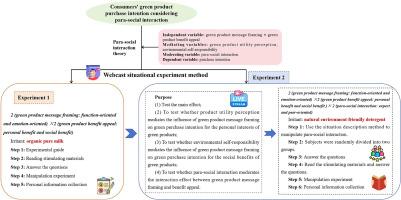考虑准社交互动的消费者绿色产品购买意向:基于直播电子商务的实验研究
IF 9.7
1区 环境科学与生态学
Q1 ENGINEERING, ENVIRONMENTAL
引用次数: 0
摘要
尽管直播电子商务在促进绿色消费方面发挥着重要作用,但要将意识转化为行动仍存在一些障碍。消费者在做出绿色购买决定时,通常会权衡个人利益和社会利益。在推荐绿色产品时,直播者应该强调个人利益还是社会利益?哪种表达方式的营销效果更好?针对这些问题,本研究通过两个实验探讨了绿色产品信息框架与利益诉求之间的互动对消费者购买意向的影响及其内部机制,并基于准社会互动理论探讨了流媒体特质的调节作用。结果表明(1)绿色产品信息框架和利益诉求的交互效应影响消费者的绿色购买意向。(2) 绿色产品效用感和环境自我责任感对绿色产品购买意向有中介作用。(3) 准社会互动调节了绿色产品信息框架和利益诉求对购买意向的影响。本研究为直播电商及相关企业优化绿色营销策略、促进绿色消费提供了有价值的启示。本文章由计算机程序翻译,如有差异,请以英文原文为准。


Consumers' green product purchase intention considering para-social interaction: An experimental study based on live-streaming e-commerce
Although live-streaming e-commerce plays an important role in promoting green consumption, there are still some obstacles to turning awareness into action. Consumers often weigh personal benefits against social benefits when making green purchasing decisions. Should streamers emphasize personal or social benefits when recommending green products? Which method of expression has better marketing effects? To address these questions, this study explores the impact of the interaction between green product message framing and benefit appeals on consumers' purchase intention and its internal mechanisms through two experiments and explores the moderating role of streamer traits based on para-social interaction theory. The results show that: (1) The interaction effects of green product message framing and benefit appeals impact consumers' green purchase intentions. (2) Green product utility perception and environmental self-responsibility mediate green product purchase intention. (3) Para-social interaction moderates the effects of green product message framing and benefit appeals on purchase intention. This research provides valuable insights for live-streaming e-commerce and related enterprises to optimize green marketing strategies and promote green consumption.
求助全文
通过发布文献求助,成功后即可免费获取论文全文。
去求助
来源期刊

Journal of Cleaner Production
环境科学-工程:环境
CiteScore
20.40
自引率
9.00%
发文量
4720
审稿时长
111 days
期刊介绍:
The Journal of Cleaner Production is an international, transdisciplinary journal that addresses and discusses theoretical and practical Cleaner Production, Environmental, and Sustainability issues. It aims to help societies become more sustainable by focusing on the concept of 'Cleaner Production', which aims at preventing waste production and increasing efficiencies in energy, water, resources, and human capital use. The journal serves as a platform for corporations, governments, education institutions, regions, and societies to engage in discussions and research related to Cleaner Production, environmental, and sustainability practices.
 求助内容:
求助内容: 应助结果提醒方式:
应助结果提醒方式:


